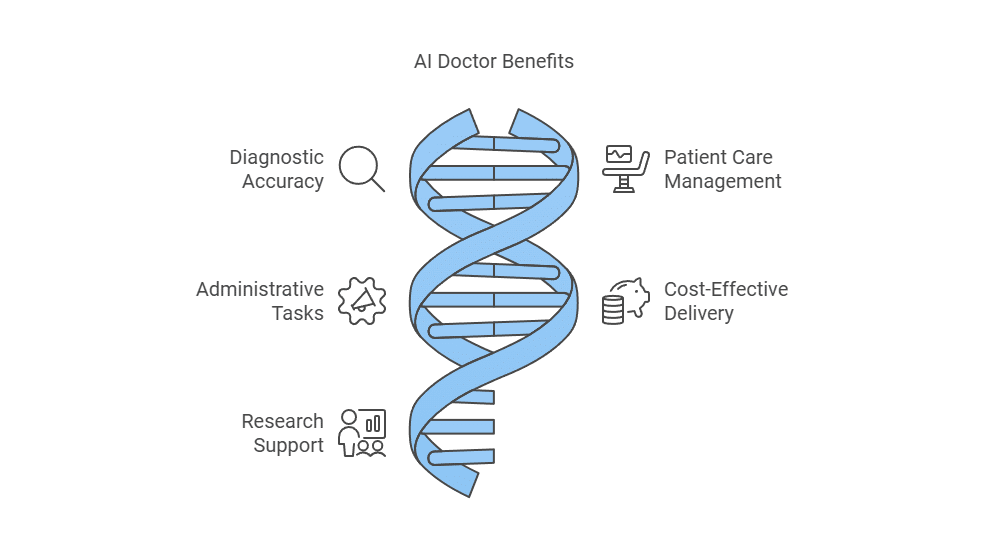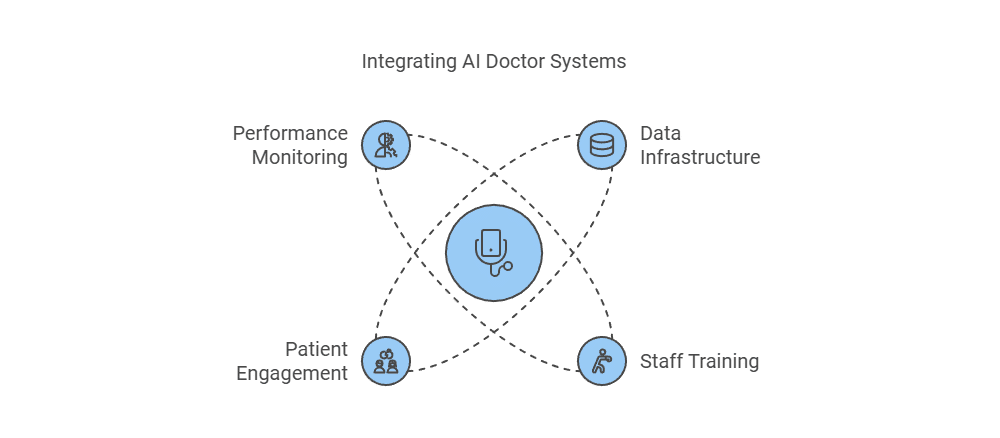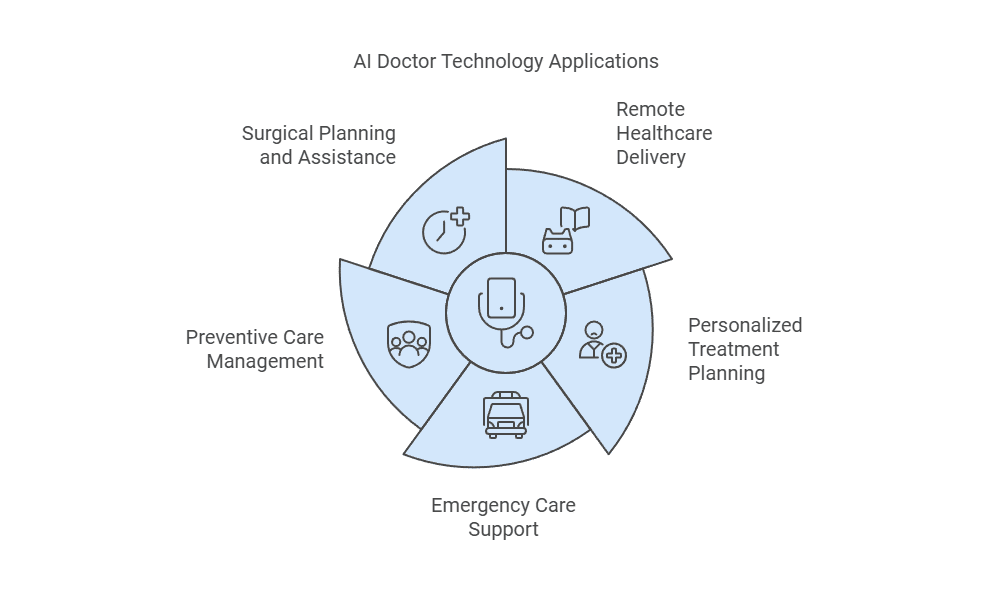AI doctor systems combine the power of machine learning with traditional medical knowledge to reap the best of both worlds. The technology is one of the most significant changes to modern medicine within the modern era. And it applies to almost every element of patient care, from initial diagnosis to weighing treatment options. In this article, you’ll learn about where current implementations are, where it’s going, and how you can get the most out of it.
Table of Contents:
What is an AI Doctor?
AI doctor systems are typically made of multiple components that leverage machine learning and AI to work with issues normally associated with physicians. Some examples include work with patients’ histories, information, imaging, and clinical data to provide diagnosis and treatment options.
An artificial intelligence doctor typically works with human staff to form a team of sorts. This combines human ingenuity with the AI’s ability to rapidly work through vast amounts of medical research.
Why AI Doctors Are Transforming Healthcare
The primary reason why AI doctor systems are transforming healthcare comes from the wide scope of the medical industry itself. Medical professionals need to work with huge amounts of information from both a patient’s medical data and the larger literature relating to any given situation. An AI system doesn’t just have the ability to work with that data but can iterate through it at a rapid pace.
Likewise, it can offer help as an AI-powered health advisor by using that information and customizing it to the patient’s needs. This all comes together to address weaknesses in the medical system such as lack of support for specific regions and staffing shortages.
Five Key Benefits of AI Doctor Implementation
There are an almost endless amount of benefits from AI doctors. However, five benefits are of such fundamental significance that they deserve special attention.
4 Ways Artificial Intelligence is Transforming Healthcare
1. Enhanced Diagnostic Accuracy
An AI doctor can work with far more variables, in a more accurate way, than traditional healthcare professionals. This can lead to a higher level of diagnostic accuracy when compared to a doctor acting alone. This also leads to more accurate oversight of treatment, recovery, and avoidance of the complications that might arise from either.
Receive Metaverse Information & Related Topics
2. Improved Patient Care Management
An AI doctor’s ability to work with massive amounts of data extends to direct patient care. For example, a health AI specialist can monitor a patient and instantly note changes in his vitals. This can result in vastly improved response time to time-sensitive issues. For example, consider the ramifications if a system is able to detect the first sign of irregularity in a patient’s pulse.
3. Streamlined Administrative Tasks
An AI doctor can handle many of the repetitive or time-consuming tasks that are an inherent part of the medical system. Working with billing, documentation, scheduling for patients and staff alike, and medication contraindications are vital but not especially engaging. An AI system is perfectly placed to step in and handle tasks that require little in the way of creative thinking. This reallocation of resources frees staff up to handle more difficult issues and direct person-to-person patient care.
4. Cost-Effective Healthcare Delivery
An AI healthcare assistant reduces costs for healthcare systems through multiple avenues. This helps to increase the availability and quality of medical care for everyone. For example, an AI doctor can handle many elements of the diagnostic process which frees healthcare workers to handle other tasks. Likewise, an AI system never gets tired or distracted. Staying focused in this manner leads to reduced error rates in diagnostic procedures. This saves time and money for both the healthcare system and patients in the long run.
5. Research and Development Support
AI is heavily focused on pattern recognition and this lends itself perfectly to medical research. An AI doctor can be used for data extraction of relevant information and analysis of that material. This leads to important discoveries for the pharmaceutical industry and different treatment protocols. The improved rate of data analysis also speeds up the development and testing of new therapeutic options for patients.

Four Critical Implementation Strategies for AI Doctor Systems
The power of an AI doctor should be apparent by now, but it’s not something that can be simply tossed into an existing infrastructure. The following points should always be considered when developing a strategy to seamlessly integrate the new technologies.
1. Comprehensive Data Infrastructure Setup
AI primarily functions through the analysis of huge amounts of specialized information. As such, the medical AI assistant needs access to a significant informational framework. A healthcare facility should ensure that its technologies can support the AI through reliable networking infrastructures and storage facilities. Likewise, data needs to be backed up on a regular basis.
2. Healthcare Staff Training and Adoption
The human component is still a vital part of medicine, even when using an AI doctor. Staff need training to understand how to leverage the system and properly integrate it into their workflow. This includes both learning what the system can do and what it can’t. Hands-on training builds both proficiency and confidence in staff using the new AI technologies.
3. Patient Communication and Engagement
Patients need help understanding an AI doctor and how to communicate their needs within that context. As such, it’s important to create literature to educate patients on how to offer feedback and use the systems. This helps the entire healthcare facility operate in the most efficient way possible.
4. Performance Monitoring and Quality Assurance
AI systems in general make heavy use of data and metrics, and this is also true for how people relate to them. Staff and patients alike should judge the AI’s performance with set metrics to help refine both the AI and how people use it. Systemic reviews, guidelines to report errors ,and more are all important elements of using the AI system.


Five Emerging Applications of AI Doctor Technology
AI doctor technology is capable of some amazing things. But the following are the five areas to pay special attention to.
Video: AI in Medicine: Possible Applications and Potentials
1. Remote Healthcare Delivery
AI doctors can provide remote consultations in a number of ways. This is often enabled by real-time monitoring devices worn by patients. A combination of real-time monitoring and predictive analytics allows the system to discover issues right as they appear or even to prevent them.
2. Personalized Treatment Planning
AI doctor implementations can give special attention to every patient. This translates into a high level of personalized care. The information taken in by the AI can also be given to emergency responders who need to know about the patient’s condition. For example, it can warn against the use of specific treatments that the individual would have negative reactions to due to allergies or injuries.
3. Emergency Care Support
Computers can move with lightning-fast speed, and an AI doctor is no exception. The systems can instantly adapt to an emergency situation to provide emergency responders with the information and guidance they need. The systems integrate mobile networks, high-speed data processing, and enhanced connections between healthcare facilities and on-location responders.
4. Preventive Care Management
An AI doctor can help with standard treatments, but the best treatment is often prevention. AI systems deal with a wealth of medical data related to each patient which can be used for both treatment and prevention. An AI system can advise on lifestyle changes or smaller procedures which can stop a minor issue from becoming a major one.
5. Surgical Planning and Assistance
Surgery involves a number of complex variables, many of which can be managed by an AI doctor. The AI systems can aid with 3D modeling, planning, and even strategies for post-surgery recovery. All of this can lead to improved outcomes and speedier recovery for patients.


Essential Considerations for AI Doctor Implementation
The following should be in place before you implement an AI doctor.
- Technological foundations: The healthcare facility needs the proper computers, storage, network, and peripherals to support an AI doctor
- Network security: The network and AI doctor system need to be secured against hacking and security leaks and maintain standards for healthcare confidentiality.
- Training: Staff will need training to properly leverage an AI doctor’s capabilities.
- Compatibility: The AI doctor needs to be compatible with the healthcare facility’s hardware, health portal, and patient records.
- Relationship of costs and benefits: Consider the cost-benefit ratio in relation to implementation and team training for an AI doctor.
- Monitoring: Metrics to evaluate the performance of the AI doctor should be established before implementation
Best Practices for AI Doctor Usage
You’ll need to keep the following best practices in mind to optimize your experience with an AI doctor.
- Updates: Ensure that the AI doctor’s infrastructure is updated along with information from the medical literature.
- Audit your data: The quality of any AI comes from the quality of its data. You’ll need to perform regular audits to ensure the excellence and standardization of its input.
- Collaboration: The various parts of the facility should work together, including the AI doctor, staff, and current technologies.
- Information for patients: This is a new technology, and patients will need some help learning how to interact with an AI doctor.
- Assess AI performance: Set metrics to evaluate the performance of the AI doctor.
- Implement systemic improvements: You should create a system to regularly gather feedback about the performance of the AI doctor so that it can be continually improved.
Artificial Intelligence in Hospitals: A Complete Guide
While the focus so far has been on AI doctor systems, machine learning as a whole is used in many different ways by the medical industry. Many of the subjects touched on with AI doctors are used in more focused capacities by specialist systems. For example, diagnostics can be tied into remote monitoring systems. This allows for real-time monitoring and analysis of a patient’s health through dedicated machine learning.
You can learn more about how hospitals are integrating AI in the article “Hospitals Using Artificial Intelligence: Revolutionizing Healthcare with Advanced Technology”.
Augmented Reality in Healthcare: Transforming Patient Care
An AI doctor is one of the most advanced and groundbreaking new technologies within the larger sphere of healthcare. However, it’s only one of many new technologies which are drastically changing the field. Augmented reality (AR) lets healthcare professionals examine diagnostic information in new ways. For example, AI can let surgeons see into a patient before even making the first incision.
You can learn about the ways AR functions in healthcare settings through real-world examples in the article “Augmented Reality in Healthcare; Clear Examples of AR in Healthcare”.
Virtual Reality in Healthcare: Revolutionary Applications
Virtual reality (VR) is another new technology that’s often paired with an AI doctor. Like augmented reality, VR gives healthcare professionals a novel way to visualize data – sometimes generated by an AI doctor. This can be incredibly useful in an educational setting. For example, a surgeon can safely practice a difficult procedure within VR. Likewise, doctors can see rare conditions or issues in VR to prepare themselves.
You can see how healthcare facilities are benefitting from VR in the article “Virtual Reality in Healthcare; Clear Examples of VR in Healthcare”.
Did You Like This Article about AI Doctor?
You might also be interested in the following articles:
AI doctor systems have a limitless range of potential. But to leverage that potential, really consider everything you’ve read and how you can apply every element to your own life.
